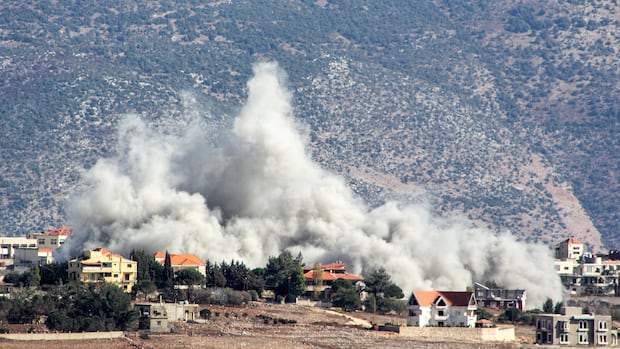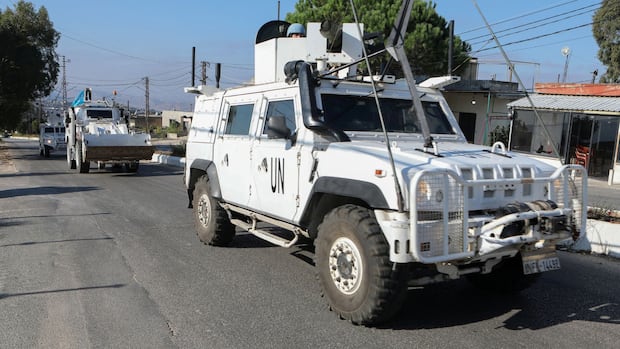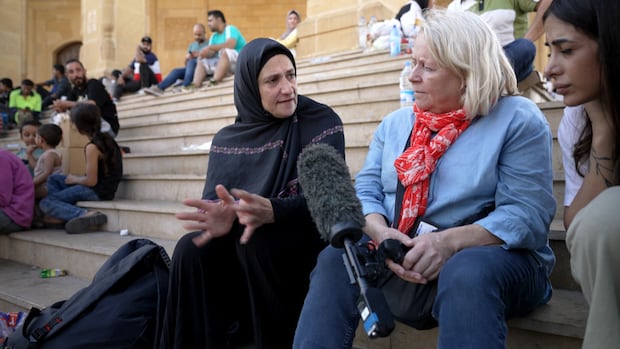As Lt. Col Jordan Hertzberg watches black smoke rise beyond a ridge moments after Israeli artillery fires into southern Lebanon, he tells CBC News that he believes Israel’s offensive could have been avoided, if the UN peacekeepers stationed along the 120 kilometres border were doing their job.
“If they had been enforcing the mandate, we would not have a war today,” said Hertzberg who is originally from Montreal.
“When we find bases, Hezbollah bases, 50 metres, and 75 metres from a UN base, what is your observation? You have to be blind and deaf not to be aware of that.”
When Israel and Hezbollah ended their war in 2006 by agreeing to a UN-proposed ceasefire, the resolution included the enlargement of the UN peacekeeping force that had already been stationed in southern Lebanon for decades.
But as war has broken out again, the 10,000 plus UN Interim Force in Lebanon (UNIFIL) has not only been unable to quell the conflict, it has also found itself in the middle of it. The peacekeepers are being attacked by Israel, which is accusing them of just being in the way.
UNIFIL’s mandate is to help enforce UN Resolution 1701 that was adopted in 2006. That includes aiding the Lebanese armed forces in clearing the area south of the Litani river in Lebanon of “any armed personnel, assets and weapons.” This area is about 30 kilometres south of the Blue Line, which was set by the UN in 2000 to confirm the withdrawal of Israeli forces.
But UNIFIL says that without co-operation from the Lebanese government or its armed forces, it’s challenging to fulfil that mandate. Meanwhile, others have criticized UNIFIL’s efforts and some observers are questioning whether it does or can play any kind of peacekeeping role in the region and whether its mandate should be renewed.
The Israel Defence Forces says it has found stashes of ammunition and rockets, along with bunkers dug into the ground close to where UNIFIL is stationed.
During a trip to the border area in the northwest of Israel on Thursday, Hertzberg accused the UN peacekeeping mission of turning a blind eye, which allowed Hezabollah to deeply entrench itself in the south of Lebanon, and enabled it to launch rockets into northern Israel throughout the past year.
Lt.-Col Jordan Hertzberg of the Israel Defence Forces said in an interview with CBC’s Briar Stewart that Israeli forces had found Hezbollah fortifications, missiles and shells ‘under the nose’ of UN peacekeepers based near the Lebanon-Israel border whose mandate is to support the Lebanese army in securing the border region.
“UNIFIL has proven ineffective in carrying out its mission for decades now, and absent significant changes, there is little hope it can play a relevant role in securing the Israel-Lebanon frontier,” read a recent analysis by the Washington Institute for Near East Policy.
“Should the force continue to under perform, Washington should once again seriously consider vetoing its mandate, ending the deployment, and starting anew.”
The analysis placed blame on the Lebanese government and armed forces for both collaborating with Hezbollah while also obstructing UNIFIL’s access to areas they want to inspect. The analysis also blames UNIFIL itself, saying it “often demurs from effectively monitoring areas that might generate tension” and “pulls punches in its reporting.”
Israeli PM urges UNIFIL to ‘get out of harm’s way’
UNIFIL has accused Israel of repeatedly targeting its positions, an accusation Israeli Prime Minister Benjamin Netanyahu has denied.
Earlier this month, he repeated a call for UNIFIL to withdraw from combat zones and said the military did its utmost to avoid harming peacekeeping personnel while striking Hezbollah fighters.
“But the best way to assure the safety of UNIFIL personnel is for UNIFIL to heed Israel’s request and to temporarily get out of harm’s way.”
He has also accused the UN force of “providing a human shield” for Hezbollah.
U.S. officials continue to call for a halt to fighting between Israel and militant groups Hamas and Hezbollah, but heavy Israeli airstrikes in southern Lebanon continue. The UN peacekeeping mission in Lebanon, known as UNIFIL, said last week that it had come under several “deliberate” attacks by Israeli forces and that efforts to help civilians in villages in the war zone were being hampered by Israeli shelling.
Writing in the Wall Street Journal, Eugene Kontorovich, a professor at George Mason University Scalia Law School and a scholar at the Jerusalem-based Kohelet Policy Forum, said he doesn’t believe they serve a useful purpose.
And when its current mandate expires in August 2025, he says there is no rational basis for reauthorizing it, which would save the U.S. the money it contributes to help support UNIFIL’s annual $550 million budget.
“It’s not a surprise that they’re failing,” he told CBC News in an interview. “But despite their failure, they continue to be reauthorized. Their failure is considered something that should be rewarded and seen as indispensable, despite not doing their job.”
Yet some observers, who have also been critical of UNIFIL, still see a role for the peacekeeping mission in the region.
“I think UNIFIL has been not very effective by any objective standards,” said Mukesh Kapila, a former UN official and current emeritus professor of global health and humanitarian affairs at the University of Manchester.
Kapila also said some Israelis do not see the peacekeepers as neutral or impartial because some of the participating countries have hostile relations with Israel. But he still says the peacekeepers should stay.
“When the war ends, you would have to pick up the pieces, you’re going to have to have some form of a peacekeeping force,” he said. “And it’s much easier to build on a peacekeeping force that exists than to start all over.

UN resolution failed to end conflict
Although UN Resolution 1701 may have ended the war between Israel and Hezbollah, conflict between the two has remained.
Hezbollah is still in the area, now with an expanded arsenal that experts estimate to be at least 130,000 rockets.
“[Hezbollah] extensively expanded its its capability in the south,” said Assaf Orion, a retired Israeli brigadier general and defence strategist who co-authored the report on UNIFIL for the Washington Institute for Near East Policy.
“Those weapons shooting at Israel from south Lebanon shouldn’t have ever been there.”
Two Indonesian peacekeepers were injured on Friday after two explosions near a watchtower in southern Lebanon, UNIFIL said. This followed two earlier injuries of peacekeepers after Israeli soldiers fired on UN positions on Wednesday and Thursday. France, Italy and UN Secretary General António Guterres have condemned the attacks. The Israeli military said it is conducting a review of the incident.
Last month, days after Israel is believed to have launched its attack on pagers owned by Hezbollah, Lebanese caretaker Prime Minister Najib Mikati said the government was ready to implement the resolution and send in a beefed up Lebanese army force that will “carry out its full duties,” in co-ordination with UN peacekeepers.
Vanessa Newby, an assistant professor at Leiden University with regional expertise on peacekeeping in south Lebanon, said one of the problems was that many within the Shia population were supportive of Hezbollah, making it difficult for an international force to try to impose such a resolution.

Without resources from the Lebanese armed forces or Lebanese government to back it up, “how can an international force actually achieve that goal,” Newby asked.
“I don’t want to sort of sing the praises of UNIFIL, but I think they kind of really do get blamed for everything that they’re not actually in control of.”
UNIFIL connects IDF, Lebanese army
Kandice Ardiel, the deputy spokesperson for UNIFIL, told CBC News that they have reported suspicious activity, including tunnels being built near the border, to the UN Security Council and the Lebanese government in recent years.
“We need facilitation from the Lebanese army. That was not forthcoming in these cases,” she said during a Zoom interview from Beirut. “So we weren’t able to investigate some of these suspicious locations that we had seen and that we had wanted to investigate.”

Ardiel, who grew up in Ontario, said UNIFIL hasn’t been asked to “disarm Hezbollah” or “forcefully push back some of the Israeli incursions.”
Instead, she says their role is to support the parties to implement UN Resolution 1701.
Newby says UNIFIL’s biggest role has been to shine an international spotlight on the region and ultimately prevent accidental outbreaks of violence that could have led to another confrontation between Hezbollah and the IDF.
She says they’ve managed to create a more stable environment by establishing a relationship between the IDF and the Lebanese armed forces through a series of meetings called the Tripartite Meetings.
At these meetings, the two negotiate micro security agreements along the Blue Line. Newby says this has helped prevent any potential incidents, or shootings of people who may inadvertently cross over.
“It reduces uncertainty, reduces the escalations you sometimes get,” she said.
Even before Israel and Hezbollah began exchanging fire in their latest conflict, Lebanon was on shaky ground, with some calling it a failed state. CBC’s Margaret Evans examines the complex factors behind the country’s eroding stability.




